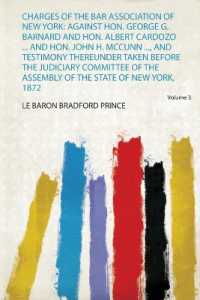- ホーム
- > 洋書
- > 英文書
- > Religion / Ethics
Full Description
Humans have been chasing immortality since the beginning of history, seeking answers to sickness and aging, death and the afterlife, and questioning the human condition. Analyzing ideas from ancient Sumer, Egypt, Greece and India, as well as the Abrahamic religions of Judaism, Christianity and Islam, this study explores how early religious models influenced later beliefs about immortality, the afterlife, the human soul, resurrection, and reward and punishment. The author highlights shared teachings among the most influential religions and philosophies, concluding that humankind has not substantially changed its conceptions of immortality in 6,000 years. This continuity of belief may be due to chromosomal memory and cultural inheritance, or may represent a fundamental way of conceptualizing the afterlife to cope with mortality.
Instructors considering this book for use in a course may request an examination copy here.
Contents
Table of Contents
Preface
1. Gilgamesh: So Human a Demigod
2. Ancient Egypt: Democratic and Magical Views of Immortality
3. Ancient Greece: Defining Immortality in an Age of Gods and Mortals
4. Hinduism: An Immortality of Nonexistence
5. Judaism: Questioning the Essence of Immortality
6. Christianity: Belief and Hope in Eternal Life
7. Islam: Declares the Final Revelation on Immortality
8. Final Assessment: Reviewing Global Doctrines and Analyzing the Human Condition
Appendix: Psalms
Chapter Notes
References
Index







